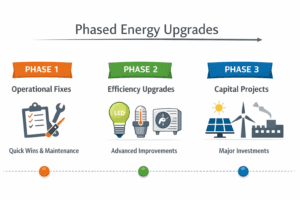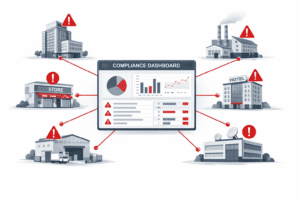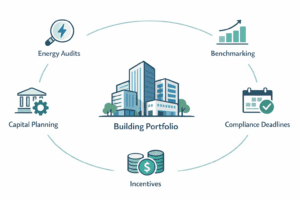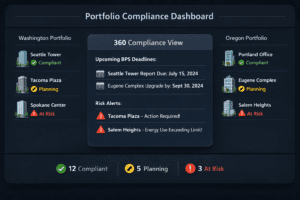Introduction
In today’s eco-conscious climate, the energy performance of buildings has stepped into the limelight, not only for the sake of global sustainability but also as an economic and regulatory concern for property owners in San Francisco. An energy audit is a pivotal first step toward understanding and improving a property’s energy efficiency. The audit process evaluates energy flows for energy conservation in a building, which can yield significant long-term benefits, not least of which include lower utility bills and enhanced market value. In San Francisco, adhering to energy standards and audit regulations is not just prudent; it’s a mandated part of property management.
The benefits of energy efficiency stretch far beyond individual cost savings. They extend to global environmental health, the reduction of greenhouse gas emissions, and the conservation of natural resources. Supporting these eco-friendly initiatives, this blog will guide you through the intricacies of San Francisco’s energy audit landscape, illustrating the risks of non-compliance, the potential financial sinkholes due to audit penalties, and the actionable steps you can take to avoid these pitfalls and align with the city’s vision of a sustainable future.
Understanding Energy Audit Penalties

San Francisco, like many progressive cities, has implemented regulations to encourage property owners to regularly assess and improve their energy usage. Energy audit penalties are essentially a form of enforcement, urging compliance through financial disincentives. These fines are levied on properties that fail to adhere to compulsory energy audits as required by local laws. The intention is clear: push property owners toward a more environmentally friendly approach to energy consumption.
These penalties are not to be taken lightly. The financial implications of ignoring an energy audit can be substantial, with fines increasing incrementally with the severity and duration of non-compliance. It isn’t just about paying a one-time fee; continued negligence can see penalties accrue, potentially leading to a significant financial burden that affects the profitability and operational costs of maintaining a property in San Francisco.
The repercussions, however, are not solely financial. There are other, perhaps more insidious, negative impacts associated with energy audit penalties. For instance, non-compliance can result in restrictions on property transactions, including selling or refinancing, which can freeze a property’s liquidity. Additionally, failed adherence may lead to legal complications, with the city enforcing compliance through the judicial system. It’s a situation that can quickly spiral out of control, impacting not only the immediate financial health of your property but also its long-term viability and reputation.
How Energy Audit Penalties Can Sink Your Property
The penalties associated with skirting San Francisco’s energy audit requirements can be daunting. A property that consistently evades these audits is at risk of sinking under the weight of mounting fines. The financial toll can strain operational budgets, leading to cost-cutting measures that might compromise the quality of property management and tenant services.
Consider the real-life implications for property owners faced with a sudden financial outlay in the form of an unexpected penalty. These can amount to thousands of dollars, a non-negligible sum that can disrupt financial planning and investment strategies. It’s not merely a hypothetical scenario; properties across San Francisco have felt the sting of such penalties, and the impact can be long-lasting.
Beyond the direct financial hit, the less overt effects are equally damaging. A property’s market value may plummet if it becomes known for energy non-compliance, making it less attractive to potential buyers or tenants who are increasingly environmentally conscious. The stigma of legal issues can tarnish the reputation of businesses associated with the property, and the burden of legal costs can further exacerbate financial strains.
The Importance of Being Energy Efficient in San Francisco
In a city celebrated for its trailblazing environmental initiatives, San Francisco has established stringent energy-efficient requirements and regulations. Such rules are more than just legislative hurdles; they reflect a commitment to a greener, more sustainable urban environment. Being energy efficient in San Francisco isn’t just about compliance—it’s also about participating in a city-wide effort to reduce energy consumption and combat climate change.
For property owners, the incentives to embrace energy efficiency resonate beyond the ecological impact. Improved energy efficiency translates into decreased overhead costs as less money is spent on energy bills. Furthermore, properties that boast high energy efficiency often enjoy a higher caliber of tenant and increased rental rates, directly benefiting the bottom line.
Moreover, properties that align with the city’s energy goals may also see an uptick in their valuation. An energy-efficient building is an asset in today’s market—appealing not only to those looking to reduce their carbon footprint but also to investors and occupants who value sustainability and cost-effective operational practices. The convergence of environmental responsibility and economic benefit makes the pursuit of energy efficiency in San Francisco a win-win proposition.
How to Avoid Energy Audit Penalties

Navigating the potential minefield of energy audit penalties in San Francisco requires proactive measures. First and foremost, comply with city regulations by scheduling and completing regular energy audits with certified professionals. These experts can help pinpoint where energy is being squandered and propose targeted improvements.
There are numerous ways to enhance the energy efficiency of a property. Upgrading to high-efficiency HVAC systems, improving building insulation, and investing in energy-saving lighting are just the beginning. The installation of advanced technologies like smart thermostats and energy management systems can also play a crucial role in reducing energy consumption.
San Francisco extends a helping hand to property owners through local resources and services geared toward improving energy efficiency. Consulting with local energy efficiency firms can provide access to the most current technologies and techniques. Additionally, the city and state offer various incentives, rebates, and financing options that can help mitigate the upfront costs associated with energy efficiency upgrades.
Implementing these changes is not merely about steering clear of penalties; it’s an investment in the future of the property. It’s a commitment that pays dividends in the form of lower operational costs, increased property appeal, and alignment with San Francisco’s green vision.
Conclusion
Comprehensive energy audits are an inextricable aspect of owning and managing property in San Francisco. While the threat of energy audit penalties looms for the unprepared, they are preventable with the right knowledge and proactive measures. Energy efficiency is a golden opportunity for property owners to capitalize on cost savings, enhanced property values, and a cleaner environmental conscience. In embracing energy efficiency, San Francisco property owners not only stand to benefit from a financial standpoint but also join the ranks of those contributing to a greener, more sustainable future for all. Now is the time to act, improve energy sustainability, and ensure your property remains penalty-free and prosperous for years.
VertPro.com serves as a resourceful platform for property owners and managers seeking to enhance their buildings’ energy efficiency. The site offers a range of services, including Commercial Energy Audits, Benchmark Compliance consultancy, and a Construction Marketplace. At the heart of VertPro® is a suite of SaaS technology-based solutions designed to assist in navigating the complexities of Energy Benchmarking and Energy Audits/RCx Plus, while ensuring adherence to over 60 Energy Benchmarking and Energy Efficiency Laws across the country.
For those looking to improve their property’s energy usage and operational value, VertPro.com provides a diverse array of tools and information. The site aims to facilitate a better understanding of energy efficiency practices and legislation, helping building owners and property managers make informed decisions about their energy strategies while complying with all energy ordinances and laws.















